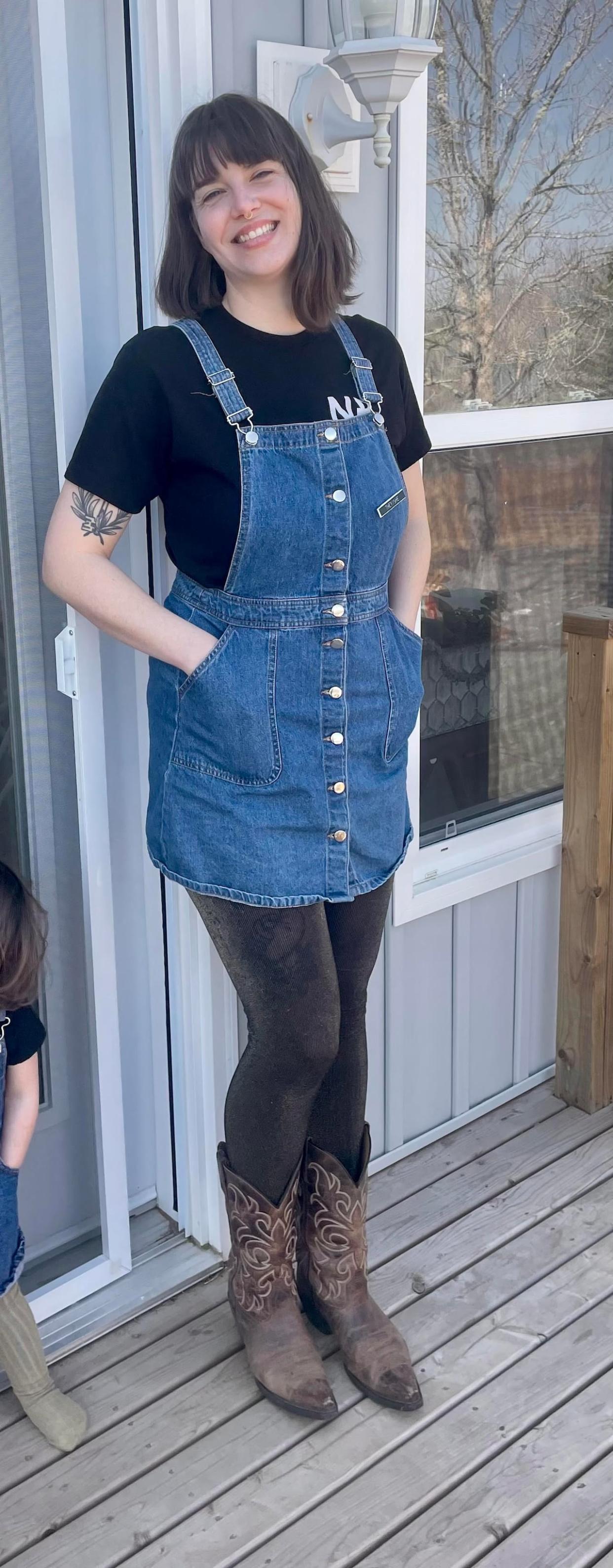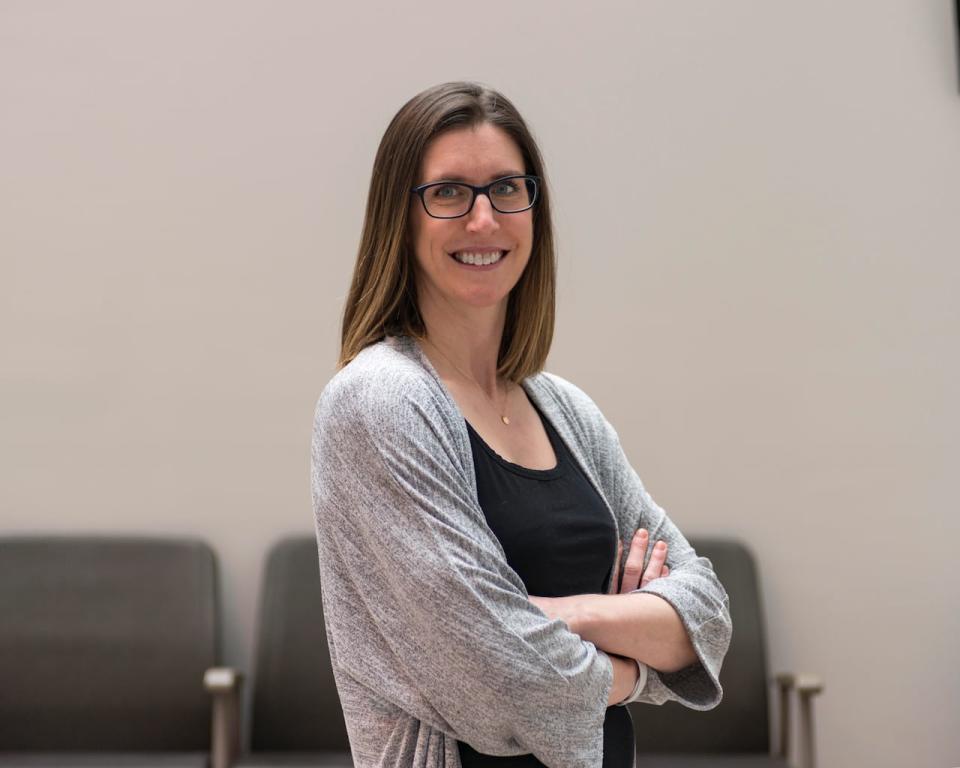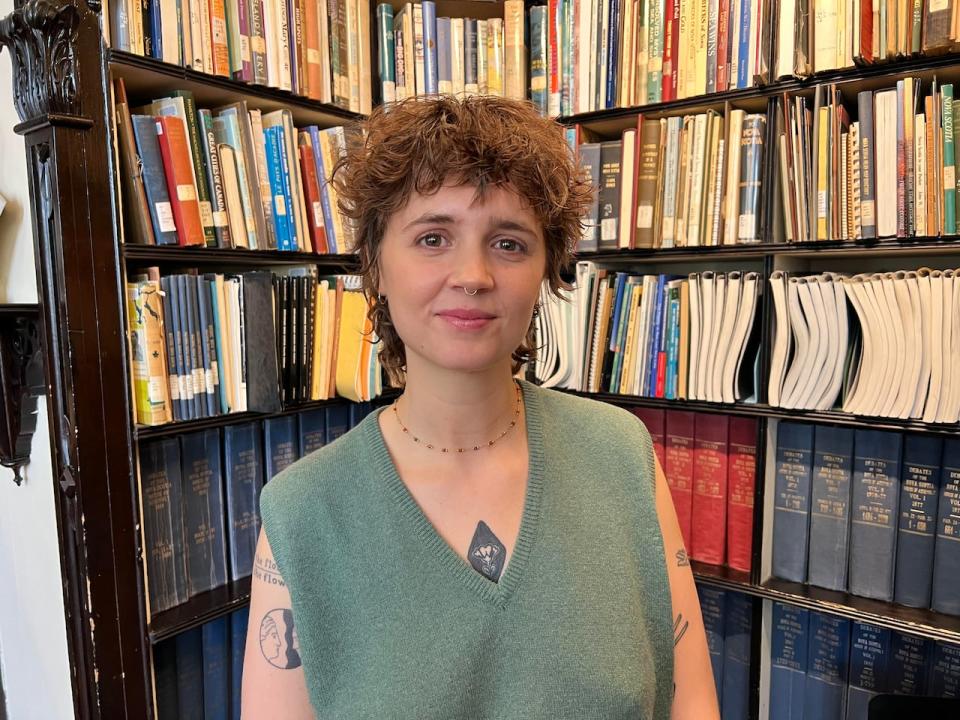Annapolis Valley woman concerned about wait time for endometriosis clinic

Victoria Martin has undergone four operations because of her endometriosis, but those procedures have not ended the pain and fatigue, nor the emotional strain she is forced to endure as a result of the disease.
The 36-year-old Wolfville woman, who is pregnant with her second child, is hoping the IWK's Endometriosis and Chronic Pelvic Pain Clinic will find a way to relieve her symptoms so she can function normally and some day return to the workplace.
"I'm concerned because, sadly, I'm used to [dealing] with the pain and the flare [ups], but I'm concerned because last time that happened, and I was able to receive care somewhere else, the damage was pretty extensive," said Martin, referring to her 2021 operation in France, where she was born and grew up. "So I'm just wondering where we're at three years later."
Endometriosis is a condition in which tissue similar to that normally found inside the uterus, grows outside of it instead. It's often very painful and the buildup of abnormal tissue around organs in the abdomen can cause problems with pregnancy, menstruation and overall health.
Despite her struggle, Martin considers herself fortunate to live only an hour away from Halifax, where specialized care has been available for three years.
But after six months on the waitlist, in the midst of a higher-risk pregnancy, she would like to be seen, at the very least, to get an MRI to determine how the disease has progressed.
"Although I'm not sure will be offered to me, in my personal case, I've had feedback from a couple of close friends who have been through the clinic and, although a very long wait — a year to get the surgeries — [they] were really, really happy with the care that they got," she said.

Dr. Elizabeth Randle, medical co-director of the IWK's Endometriosis and Chronic Pelvic Pain Clinic, says the delays are due to a lack of primary care providers and "a lack of publicly funded resources to allow us to provide the best evidence-based care to this patient population." (Ryan Wilson/IWK)
According to the clinic's medical co-director, Dr. Elizabeth Randle, patients are currently waiting a year to 18 months to be seen, depending on the urgency of their medical situation.
That doesn't include the year to two-year-long wait simply to be referred to the clinic. Each referral is individually triaged by a physician and more urgent cases are seen sooner.
"The big delays, at this point, are the lack of primary care providers, a lack of publicly funded resources to allow us to provide the best evidence-based care to this patient population," said Randle. "[Endometriosis] is so challenging to treat that we need more funding from a manpower standpoint, as well as from a research standpoint to really continue to move the needle on treating this disease."
Clinic had 247 patient visits last year
The clinic is made up of two gynaecologists, one anesthesiologist, a nurse practitioner, a social worker, a physiotherapist and a dietitian. Because they have other duties, including research, the clinic sees patients one day a week.
According to the IWK, the clinic handled 247 patient visits in 2023 — excluding physiotherapy and social work. Most of those patients were Nova Scotians seeking care, although there are patients from New Brunswick and P.E.I.
Even with the backlog, Randle says the lack of understanding about endometriosis means many more people are suffering without knowing they have the disease.
"There's likely many more patients out there that we don't even know about right now, who are suffering in silence and have felt let down by the medical system over the decades that they've been trying to seek care," said Randle. "We hear that story time and again from patients who are able to access our care."

Faith Lamoureux, 28, underwent a hysterectomy last April. She was at Province House on March 1 to mark the province's first ever Endometriosis Awareness Month. (Jean Laroche/CBC)
That was Faith Lamoureux's experience. The 28-year-old Dartmouth woman had a hysterectomy last April because of the extensive damage caused by disease before it was properly diagnosed. Doctors chose to operate because they thought the pain might be linked to a cancerous growth.
Lamoureux said she was a frequent visitor to ERs throughout her 20s.
"I would be in so much pain that I couldn't get out of my bed so my husband would have to carry me to the car, carry me to the emergency room," said the small business owner. "Some days I'd wake up and I'd feel like something was imploding inside me, and some days I'd wake up and I just couldn't leave [the house]."
'We need more funding'
She said she was often prescribed anti-inflammatory medication, but that eventually caused stomach problems that were sometimes even more painful than the endometriosis.
"It kind-of barrel-rolled into more issues."
An emergency room physician suggested Lamoureux might have endometriosis but he told her he didn't know much about it, and neither did family and friends she talked to about her health problems.
She was at Province House on March 1, to mark the province's first ever Endometriosis Awareness Month to talk publicly about her experience in the hopes increased awareness will lead to more resources for women who suffer from the disease.
Randle would love to have more resources.
"We need more funding for people to fill the gaps in care, we need more funding to facilitate people getting referrals on a more expedient basis, we need more money for the allied health providers, we need more money to fund the research, we need money from a pharmacare standpoint," said Randle. "So we need money."
MORE TOP STORIES


